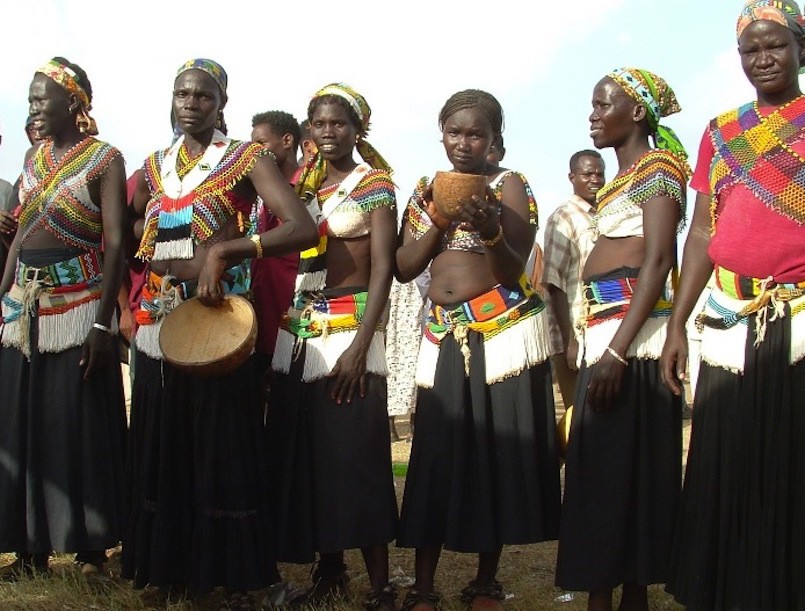Africa
Latuka Men Kidnap Their Prospective Brides, And It Isn’t As Barbaric As You Think

Tucked away in the southeasternmost corner of South Sudan you’ll find the Latuka people. There are about 200,000 of them, and they’ve been living the same way for centuries. Their economy has always been agrarian, mostly raising cattle, but also farming on a small scale. Each family has their own garden and house, but the tribe is very much a communal place. Certain village elders hold special positions of influence, but for the most part everyone shares equally. The Latuka have held onto their ethnic religion quite well, honoring elders and nature above all else. They’ve withstood the onslaught from Christian missionaries and the invasion of Islam into Africa better than other groups in the region. In fact, the only thing that’s change drastically is the technology they use and the clothes they wear—well, that they’re wearing clothes now when they hadn’t in the past.
One thing that hasn’t change is the Latuka’s courting tradition.
Courting among the Latuka is both beautifully ritualized and (not so) frighteningly foreign. We use the word frightening, but only in the sense that it’s unique, and slightly different from western dating and courting traditions. It sounded drastically different and alien to us at Outward On, but only until we sat down and discussed it objectively.
To get to the point, when a young man wants to marry a girl, he kidnaps her from her home, at which point the young man and his elder male relatives approach the girl’s father to ask him for their blessing to marry. The father will either give his consent or not, with a “yes” resulting in the father physically beating the man he’s just permitted to marry his daughter. If the father responds “no”, the young man will return the father’s daughter, or he will refuse and marry her anyway.
Aside from the kidnapping, the beating and the level of involvement from the bachelor’s family, this ritualized practice isn’t that dissimilar to other cultures. Many Americans still undergo the same formalities, even if the eventual nuptials are considered a foregone conclusion by both families. Men have always sought a girl’s father’s permission to marry her. It’s taken different forms through the ages, but it has always been there.d
Among the Latuka, young men will sometimes refuse to return the girl he kidnapped if her father declined the marriage offer. He might just marries her anyway. That, too, is quite common. It very much sounds like what we call eloping, and none of us find that too disturbing.
The same things are even happening in same-sex relationships as the LGBT community blurs the lines of heteronormativity more and more. This idea of passing ownership and staking claim to another human in the name of romance is unique to no culture; it’s a universally human practice.
People will point to the kidnapping and beating as signs of incivility and barbarism, but—if we speak loosely—the same thing happens in the English speaking world all the time. Modern couples often date for years, living together long before marrying, and to a father this probably seems like his daughter’s boyfriend has stolen her away already.
What about the beating? We ought to remind ourselves that there is often a very earnest and heartfelt discussion about what happens if the young man ever mistreats a father’s daughter. It’s not the physical pain that matters. What is important in the Latuka tradition, and similarly in the conversation between a girl’s father and her prospective fiancé, is the idea of responsibility passing from one male to another, and there being consequences for not assuming that responsibility. It’s part male dominance and part reminder that there is a price that has to be paid for the right to marry. Entering that commitment shouldn’t be easy; it should be difficult. A man should want to marry a woman enough that he’s willing to be beaten for her. It’s about the sacrifices he’s willing to make for the woman he loves.
You visually see this handoff from father to son-in-law in “traditional” Western weddings when a father walks his daughter down the aisle, physically passing her from himself to her fiancé. Gender inequality conscious people will likely cringe at the way women are treated as a commodity, being given from one man to another, but this is a universality if ever there has been one in earth’s history. The Latuka tradition and Western practices aren’t as dissimilar as most people think.
For a people who’ve lived and carried on the same traditions for centuries, with little more changing than the clothing on their backs, the wedding traditions of the Latuka are remarkable modern in their primitiveness. The biggest distinctions between Latuka courting and Western engagements aren’t the kidnappings or beatings, but it’s the familial involvement on behalf of the young man that marks them as unique.
That detail is a footnote lost behind the shadow cast when the words kidnapping and beating are thrown around. But the level of family involvement, the fact that the entire family and tribe come together, that is impressive. In fact, maybe we can learn something from the Latuka. Maybe Western families can take the time to get closer and to be more involved in each others’ lives. Maybe the Latuka are doing something right, and we’re doing it wrong.
Maybe.


0 comments